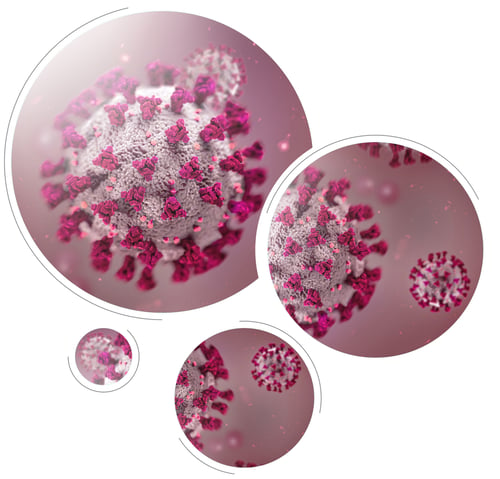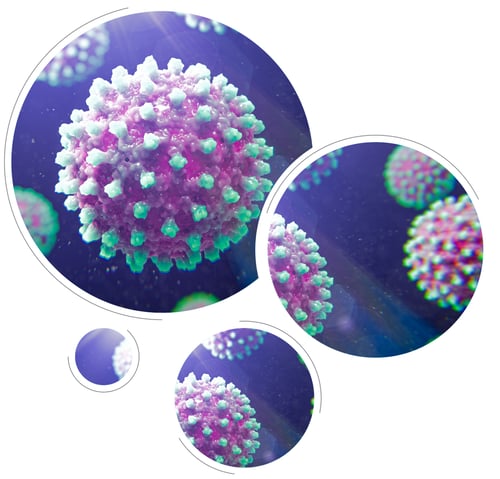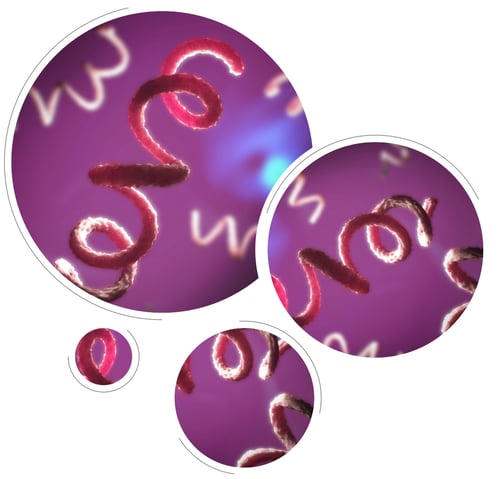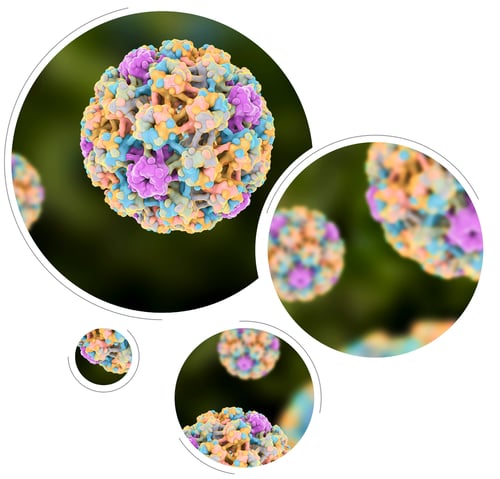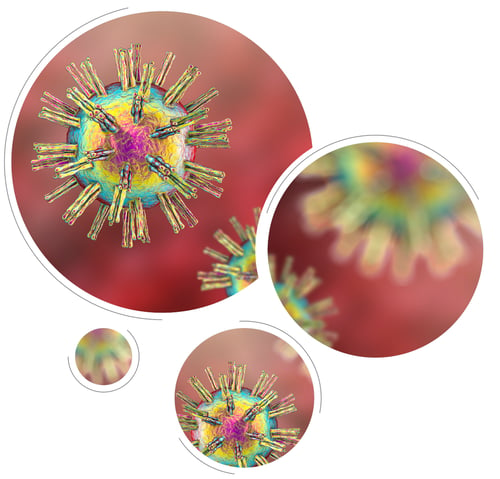Raw Materials for Sexually Transmitted Disease (STD) Diagnostic Manufacturing
Prompt and early diagnosis of sexually transmitted infections is important to enable appropriate treatment and help prevent further transmission. IVD manufacturers require innovative, high quality and guaranteed supply of raw materials so they can provide timely, accurate and reliable STD diagnostic assays to clinical labs.
Meridian offers complete solutions across a wide variety of STD targets, including antibodies and antigens for immunoassays, and innovative qPCR master mixes for molecular testing.
Top Five Most Concerning STDs
HIV-1 & HIV-2
Global aim to end the epidemic by 2030
The World Health Organization (WHO) and other agencies aim to end the HIV epidemic by 2030. As part of that, the United Nations has an initiative for 95% of people with HIV to know their status by 2025.
Laboratory diagnosis is the only way to confirm an HIV infection and there are specific serologic markers that can be detected early in the course of an infection: (1) HIV RNA detectable 11 days post-infection using molecular methods, (2) HIV-1 P24 Antigen detectable 16 days post-infection, and (3) HIV Antibodies detectable 22 days post-infection.
Meridian's portfolio of immunoassay HIV reagents includes antigens and sensitive antibody pairs to HIV-p24, HIV-1 gp41 and HIV-2 gp36 for rapid lateral flow assays. In addition, Meridian's inhibitor-tolerant qPCR and LAMP molecular master mixes are lyophilization capable, ideal for developing ambient-temperature stable assays, and available in specimen-specific formulations for saliva, urine, and blood.
HBV
WHO aims to close the gap in diagnosis and reduce new infections by 90% by 2030
Both serologic and molecular tests are available for HBV screening, however, the WHO recommends serologic tests in their “Guidelines on Hepatitis B and C Testing”.
Common immunoassays include the HBsAg test for active infection, the anti-HBc test for past infection, and the anti-HBs test for HBV immunity. Combined, these three tests (the triple panel HBV test) help healthcare providers assess an individual's current infection, past exposure to HBV, and immune response. Molecular assays play a crucial role in diagnosing viremia and managing diseases and test types include quantitative viral load tests, genotyping assays, drug resistance mutation tests, and core promoter/pre-core mutation assays.
Meridian offers high-performing HBV antigens and antibodies for HBsAg, anti-HBc, or anti-HBs tests, along with molecular master mixes and enzymes for viral load, genotyping, or mutational analysis.
Syphilis
Increase in resistance to antibiotics is contributing to its growing spread
Twenty years ago, syphilis, caused by the bacterium Treponema pallidum, was in decline. Over the past decade, syphilis infections surged, with 7.1 million new cases reported globally in 2020, according to the World Health Organization.
Two different types of serologic tests (nontreponemal antibodies and treponemal antibodies) are required to diagnose an active syphilis infection. Treponemal tests detect antibodies to T. pallidum proteins. Nontreponemal tests detect antibodies directed against lipoidal antigens, damaged host cells, and treponemes. New molecular tests are also available that can detect syphilis DNA from suspected primary lesions. These tests provide sensitivity advantages because they do not rely on the presence of antibodies or large bacterial quantities.
Meridian offers a broad range of sensitive antibody and antigen pairs for syphilis, including an innovative T. pallidum P17 + P45 Chimeric Recombinant Antigen pair for lateral flow tests. Additionally, our range of inhibitor-tolerant molecular master mixes and enzymes for qPCR and LAMP amplification allow direct detection from clinical samples, simplyfing the workflow for point-of-case assays
HPV
WHO aims to achieve a 70% HPV screening target by 2030 to reduce cervical cancer
HPV is a common viral infection causing skin and genital warts with 90% of cases self-resolved by the body. However, infection with a high-risk type can lead to cancer - HPV-related cancers cause 3% of women's and 2% of all men's cancers.
Traditional pap smears for HPV screening miss over 40% of abnormalities and are being replaced by a new HPV viral DNA test that distinguishes high-risk from lower-risk strains. This PCR-based can detect up to 14 different HPV types in a single assay within 60 minutes and in June 2023, was listed by the World Health Organization as the fourth prequalified test for HPV. Prevention of HPV-associated precancer and cancer is a key element of WHO’s “Global health sector strategy on, respectively, HIV, hepatitis and sexually transmitted infections, 2022–2030”.
Meridian offers the complete solution to HPV testing, including antibodies and antigens to the high-risk strains HPV 16 & 18 for immunoassays, and innovative qPCR master mixes for molecular testing including a Lyo-Ready Genotyping Direct qPCR Urine Mix is ideal for developing self-collection, PCR-based HPV-type tests.
HERPES
Effective diagnostics and disease monitoring are critical to lowering the risk of spreading HSV
HSV-1 and HSV-2 are among the most common viral infections worldwide. The World Health Organization has estimated that up to 67% of the world’s population has HSV-1 (oral herpes), and 13% has HSV-2 (genital herpes). It is a leading cause of viral encephalitis as well as infectious blindness worldwide, and infection with HSV-2 increases the risk of acquiring HIV infection by approximately three-fold.
Herpes can be diagnosed by detecting the virus in lesions through serologic or molecular testing, or by identifying antibodies in the blood. Overall, type-specific HSV testing that can identify and differentiate the type of HSV in the absence of lesions and other symptoms is preferred. In addition, point-of-care testing by rapid assay or LAMP is popular as it can be performed on the spot, identifying, and treating infected individuals quickly.
Meridian has high-performing native and recombinant antigens to HSV-1 and HSV-2 that are ideal for serologic HSV IgG type-specific testing. In addition, Meridian’s inhibitor-tolerant LAMP and qPCR mixes are highly suited to direct detection and differentiation of HSV-1 and HSV-2 DNA from lesion specimens.

Molecular Master Mixes & Enzymes

Antigen & Antibodies

Immunoassay Blockers

Custom Assay Manufacturing

Supporting Reagents

.webp?width=252&height=70&name=CBM_LogoModifications_White%20(1).webp)
